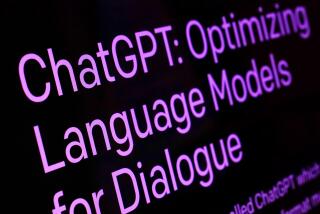Your Humble Correspondent Finds a Storehouse of Syllabuses
- Share via
Few things pedagogic sound more dubious than that vintage phrase “correspondence course.” But maybe it’s time to rehabilitate this unfortunate term.
The Internet offers a broad range of online learning experiences, including regular classes that do seem to be correspondence courses, more or less, but many of them are offered by major universities charging tuition and even offering credit toward a degree. Many of these courses are taught by the same instructors you would get if you attended school in person.
If you’re interested in taking one of these classes, probably the first thing to do is point your World Wide Web browser at https://www.then.com/, where you’ll find the Home Education Network. In partnership with the network, the UCLA Extension program is offering 28 courses entirely online, on subjects including accounting, food and beverage management, creative writing and computer programming. UCLA Extension also has it own pretty slick home page at https://www.unex.ucla.edu/
But since distance doesn’t matter much on the Internet, why limit yourself to L.A.? For a listing of online courses offered by universities all over North America, try https://www.caso.com/iuhome.html, where you’ll find an online version of a book called “The Internet University.” A wide range of courses is listed here, from a wide range of institutions, including such stalwarts as the Universities of Massachusetts, Washington and Wisconsin.
In all honesty, I was surprised at the range of learning resources available on the Internet. One of the nicest things about many of them is that you can learn even if you don’t intend to pony up any cash.
For example, one site that should have broad appeal is the Paradigm Online Writing Assistant at https://www.idbsu.edu/english /cguilfor/paradigm/. Everybody should know how to write, after all. My own life could serve as a cautionary tale to the young; without good writing skills, I find myself among those condemned to a sort of virtual Grub Street, hacking out a meager existence with my word processor and my wits.
Perhaps Paradigm can save you from all that. Created by Chuck Guilford, a veteran writing instructor who teaches at Boise State University, it offers some reasonable suggestions for improving your prose (and your thinking), as well as exercises that enable you to test the lessons that are offered.
If you’re interested in any kind of Internet learning at all, don’t miss the World Lecture Hall at https://www.utexas.edu/world/lecture/. The World Lecture Hall “contains links to pages created by faculty worldwide who are using the Web to deliver class materials.”
I tried this and found all sorts of interesting courses on a wide range of subjects, literally from accounting to zoology. Although the World Lecture Hall is maintained at the University of Texas, listed classes are all over the map, geographically speaking.
The materials available electronically vary from class to class, but typically you’ll find a course description, reading list and links to at least some online texts, so it would be a small matter, if you can get to a good library, to do the reading. Some courses even have the full text of lectures, as well as pictures, readings and other material. It’s not the same as being there (it’s not even the same as some good lectures on videotape), but if you’re interested in self-directed learning, the World Lecture Hall is still a wonderful resource.
Having seen the possibilities via the World Lecture Hall, I wish more institutions, particularly state colleges and universities, would make more course work available via the Internet. Plenty of schools offer syllabuses for some classes, or even a few Internet-only classes, but I’d like to see more institutions get all their course materials for all their regular classes onto the Internet, for the benefit of anybody who wants to learn something. The cost should be modest, after all, since government funding, tuition and endowments have already paid for the work that went into creating the class.
On the other hand, difficulties can easily arise. The Web site for an art class at USC, for example, no longer posts images that were used in the course, because of copyright considerations.
After spending some time investigating syllabuses on the Internet, it struck me that another way to use this new tool is in one’s capacity as taxpayer or, worse yet, tuition-paying parent. Simply by prowling around online, you can investigate what brand of folderol is being peddled in those ivy halls during the few hours a week students are actually in class.
For instance, which taxpayer can fail to take satisfaction at having made possible a course called Slacker Stories? Taught at the State University of New York-Cobleskill, it was “designed to study the literature, art, politics and philosophy of today’s twentysomething generation,” and the syllabus is right there on the Internet, at https://www.ice .net/~nehring/slacker/cor.htm. Or, at Drake University, there is Youth Music and Culture (https://www.drake.edu/ swiss/Homepage_final.html), a course in which readings include a work titled “Madonna: Plantation Mistress or Soul Sister?”
I checked in at my own formerly tradition-bound alma mater and discovered the syllabus for an introductory comparative literature class that touts itself as follows: “If you only take one course about literature at Penn, this should be it!” Sure enough, the course appears to touch on all the non-arctic continents, various native peoples and sexual persuasions, colonialism, hypertext, landscape architecture, medicine and, of course, the media.
Lectures include “Orality, Performance, Transmission”; “Dracula, Syphilis, AIDS: Fin de Siecle Infections”; and the inevitable perspective on Kafka, “Before the Law: Joseph K and OJ.” My favorite student comment is the one that ends, after 400 words on colonialism, with a sort of postmodern shrug, “Then again, I could be wrong.”
Now, the great thing here is that you don’t have to accept the snide prattle of an ignorant alumnus like me. You can point your own Web browser at https://ccat.sas.upenn .edu/Complit/coml100/, get the reading list and even access some of the lectures, or at least lecture notes, for yourself. After that, you’re on your own. I’m going to see if I can download some beer from one of these frat houses.
Daniel Akst can be reached at dan.akst@latimes.com. His World Wide Web page is at https://www.well.com/~akst/


